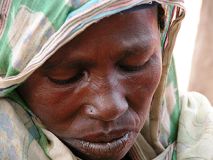Rice arrives in Sudan urging stepped-up effort on Darfur crisis
KHARTOUM, July 21 (AFP) — US Secretary of State Condoleezza Rice arrived here urging a stepped-up effort by Khartoum and its African neighbors to end what she again called genocide in Sudan’s battered region of Darfur.

|
|
Many of the refugees’ faces in Breidjing camp in eastern Chad reflect their immense suffering and the doubts over when it will be safe to go home. US Secretary of State Condoleezza Rice arrived in Sudan urging a stepped-up effort by Khartoum and its African neighbors to end what she again called genocide in Sudan’s battered region of Darfur (WFP). |
Rice’s first visit to Sudan also came amid concern about the pace of the African Union’s deployment of forces to monitor the situation in Darfur, where hundreds of thousands of people have died since February 2003.
She was to confer with Sudan’s President Omar al-Beshir and new Vice President John Garang before heading to Darfur for a look at the suffering described by the United Nations as the world’s worst humanitarian crsis.
The chief US diplomat flew in early Thursday from Senegal, where she told reporters the United States had not softened its assessment of the conflict pitting Darfur rebels against the government and its militia allies.
“The United States believes that by our accounts it was and is genocide,” she said, reiterating a designation made by her predecessor Colin Powell last year but rarely invoked by US officials more recently.
Rice said she was willing to proclaim a “new day” with the national unity government installed this month under a peace accord signed in January to end 21 years of civil war between Khartoum and rebels in southern Sudan.
But she added she expected more decisive movement to end the fighting in Darfur. “We don’t rely on words, we rely on actions. We have gotten some help from the Sudanese government but by no means enough,” she said.
Rice, who was to visit a camp for displaced people and meet women victimized by violence in Darfur, flew in after signaling concern over progress in African Union plans to more than double its monitoring force to 7,700 troops.
Referring to intensive US diplomacy on Darfur, she said, “The United States cannot do this alone. … We need everybody to make a maximum effort, including the AU and including other members of the Security Council.”
She made her remarks at a joint news conference Wednesday with Senegal Foreign Minister Cheikh Tidiane Gadio, who blasted the 53-member AU for not moving quickly enough to stop the bloodshed and deaths in Darfur.
Gadio said his government was “totally dissatisfied” with the AU’s failure to follow up after claiming the ability to resolve the crisis, which has left up to 300,000 people dead and more than two million homeless.
“We don’t like the fact that the African Union has asked the international community to allow us to bring an African solution to an African problem and unfortunately the logistics from our own governments do not follow.”
Rice’s visit to this country, under US sanctions and still branded by Washington a state sponsor of terrorism, came after three trips by her deputy Robert Zoellick to push efforts to restore peace throughout Sudan.
Andrew Natsios, director of the US Agency for International Development (USAID) and one of the officials accompanying Rice, described an improving situation in Darfur in recent months.
He said more aid was getting through, the food situation was stable and the mortality rate had descended to less than one per day per 10,000 people from six or eight per 10,000 people at the height of the crisis.
Natsios said the level of attacks on villagers had diminished since the “ethnic cleansing” of 2003-2004. “The major reason for this frankly is that there are not many villages left to burn down and destroy,” he said.
The presence of AU forces has stabilized security, he said, and the Sudan government appeared to have stopped conducting joint military operations with its Janjaweed militia allies since February-March.
But Natsios said there had been no progress in disarming the Janjaweed and “that’s a remaining problem of serious consequence.” He also reported that violence against women in Darfur stood at a “disturbingly high level.”
